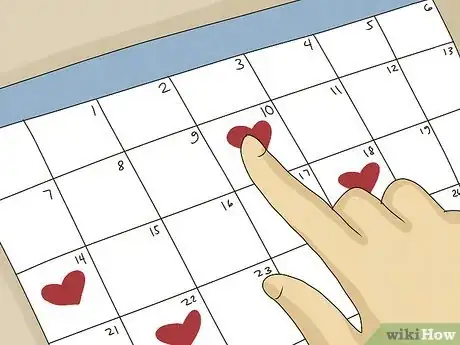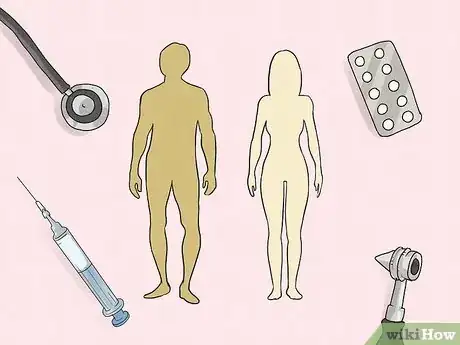This article was written by Jacqueline Hellyer and by wikiHow staff writer, Jessica Gibson. Jacqueline Hellyer is a Licensed Psychosexual Therapist and the Founder of The Love Life Blog and The LoveLife Clinic. With over 20 years of experience, Jacqueline specializes in sex advice, sex tips, and relationship advice. In addition to being an accredited Psychosexual Therapist with the Society of Australian Sexologists (SAS), Jacqueline is also a Professional Certified Coach with the International Coach Federation (ICF). Jacqueline holds a BSc in Biochemistry and Human Sciences from The Australian National University, a Graduate Diploma in Applied Science from the University of Canberra, a BA in Languages and Literature from the University of New England (AU), an MSc in Sexual Health from The University of Sydney, and an MSc in Consciousness, Spirituality & Transpersonal Psychology from The Alef Trust. Her work and expertise have been featured in Australian Men’s Health, Cosmopolitan, Australian Women’s Health, Marie Claire, and 60 Minutes.
This article has been viewed 14,443 times.
There's an assumption that sex gets boring the longer you're with someone, but is boring sex inevitable? Sexual boredom can mean different things to everyone, but it's totally normal for couples to experience it at some point. See what our experts had to say about sexual boredom and keep reading for their suggestions on how to keep the passion alive in your relationship.
This article is based on an interview with our licensed psychosexual therapist, Jacqueline Hellyer, founder of The Love Life Blog and The LoveLife Clinic. Check out the full interview here.
Steps
Is sexual boredom inevitable in a relationship?
-
No—just because you're in a relationship doesn't mean sex has to become boring. Sexual boredom can mean a lot of things, mainly sex that's dull, routine, or the same every time.[1] X Research source Because so many factors can contribute to it, it's not inevitable. While it's true that most relationships aren't always as passionate as when they began, sexual boredom isn't a given.[2] X Research source
- Since sexual boredom is so subjective, it means different things to everyone, and there's no precise amount of time when sex becomes boring. A couple's sex life is as unique as they are, so you can't put a timeline on passion or boredom.
When does sexual boredom happen?
-
1When sex is just routine or passionless. Ever heard of maintenance sex? This is when a couple has sex just for the sake of doing it, even if they don't feel like it. They might do it because they always do it on that day of the week for instance. While there's nothing wrong with predictable sex, it's not very exciting, so it doesn't stimulate you the same way.[3] X Research source
-
2When health problems cause sexual dissatisfaction. Sometimes, a medical issue can reduce your sex drive or make sex painful. Medical issues like depression, ADHD, sleep problems, or even diabetes can reduce sexual satisfaction.[4] X Research source
-
3When couples become scared to try new things in the bedroom. Part of what makes sex so exciting in an early relationship is that everything is new! Over time, partners figure out what satisfies them sexually and they tend to stick with the same things. Eventually, partners become afraid to try new things. They stick to their comfort zones, which becomes dull.
Preventing and Fixing Sexual Boredom
-
1Spend more time on foreplay and setting the mood. If sex has become routine or you're worried that you do the same things every time before sex, shake things up! Make sex more about intimacy and emotional connection so it feels passionate and exciting.[5] X Expert Source

Licensed Psychosexual Therapist Expert Interview. 15 October 2021. Set aside time for sex rather than leaving it to when you're both tired. Focus more on foreplay and figuring out what stimulates your partner. These can help you both get in the mood.- If you always wait for your partner to initiate sex, take the lead. You might feel vulnerable doing this, but putting yourself out there will strengthen your connection to your partner.
-
2Communicate your sexual needs to your partner. Think of sex as a mutual hobby and talk about it so you both get your desires met. You don't have to wait until you're having sex to talk. Bring it up beforehand and just share that you'd like to spice things up a little. Offer some suggestions and ask how your partner is feeling about your sex life. Being on the same page can make sex more powerful and satisfying.[6] X Expert Source

Licensed Psychosexual Therapist Expert Interview. 15 October 2021.- For example, you might say, "It seems like we're in a bit of a rut with our sex life. I was thinking we could try some new things. What do you think?"
-
3Be spontaneous or more adventurous with your sex life. Studies found that people had higher sexual satisfaction when they had more variety in their sex life.[7] X Research source This might mean trying new positions, having more oral sex, having sex more often or in different places—anything that stimulates desire.
- For instance, you might try something that you've never done as a couple. Do role-playing, sexy talk, phone sex, or set a romantic mood.
-
4Treat underlying medical conditions that make sex unsatisfying. If you or your partner have medical concerns, it's really important to see your primary care physician. They can help you treat sexual dysfunction, manage depression, treat ADHD, or address sleep problems, all of which can impact your sex life.
-
5Spend time doing exciting new things out of the bedroom. Your body releases dopamine, a neurotransmitter that can make you feel pleasure, both during sex and when you're doing fun new activities. Get out with your partner and just play![8] X Expert Source

Research & Clinical Psychologist Expert Interview. 6 August 2021.- You might go out to a concert, hit the trail, or try a new activity like dance classes or rock climbing.
- If you're not sure what to do together, have one person take the lead and plan a surprise date. Then, trade-off so next time, the other person comes up with the fun activity. This can keep your dates surprising and exciting.
-
6Work together with a sex therapist or coach. You don't have to wait until there are major problems in your relationship; reach out to a sex therapist for tips on how to improve your sex life.[9] X Expert Source

Licensed Psychosexual Therapist Expert Interview. 15 October 2021. They can help you communicate your needs to your partner and teach you ways to physically connect with them so you two feel more intimate.- For instance, a sex therapist might help you explain to your partner what you're hoping for from sex. If you have a hard time talking about sex, they can help normalize it so you feel comfortable talking about it.
You Might Also Like

 Signs Your Ex Will Eventually Come Back
Signs Your Ex Will Eventually Come Back


 What Are the Bases in a Relationship? Defining the Baseball-Sex Metaphor
What Are the Bases in a Relationship? Defining the Baseball-Sex Metaphor
 The Top Emojis a Girl Will Use if She Likes You
The Top Emojis a Girl Will Use if She Likes You
 How to Tell if Your Girlfriend Is Horny: 12 Signs She's Turned On
How to Tell if Your Girlfriend Is Horny: 12 Signs She's Turned On
 What to Do When Your Girlfriend Is Mad at You (10+ Steps to Take)
What to Do When Your Girlfriend Is Mad at You (10+ Steps to Take)
 12+ Texts to Send Your Girlfriend After a Fight: Apologies & More
12+ Texts to Send Your Girlfriend After a Fight: Apologies & More
 How to Have Phone Sex with Your Girlfriend
How to Have Phone Sex with Your Girlfriend

 33 Sweet & Romantic Apology Messages for Your Love
33 Sweet & Romantic Apology Messages for Your Love

 12 Ways to Break a Narcissist's Heart
12 Ways to Break a Narcissist's Heart
References
- ↑ https://www.researchgate.net/publication/244886818_Men_in_love_Living_with_sexual_boredom
- ↑ https://www.tandfonline.com/doi/full/10.1080/00224499.2015.1137854
- ↑ https://www.researchgate.net/publication/244886818_Men_in_love_Living_with_sexual_boredom
- ↑ http://psychiatriapolska.pl/1087__1099__.html
- ↑ Jacqueline Hellyer. Licensed Psychosexual Therapist. Expert Interview. 15 October 2021.
- ↑ Jacqueline Hellyer. Licensed Psychosexual Therapist. Expert Interview. 15 October 2021.
- ↑ https://www.tandfonline.com/doi/full/10.1080/00224499.2015.1137854
- ↑ Mary Church, PhD. Research & Clinical Psychologist. Expert Interview. 6 August 2021.
- ↑ Jacqueline Hellyer. Licensed Psychosexual Therapist. Expert Interview. 15 October 2021.
About This Article























































